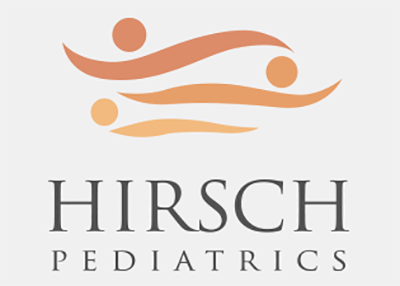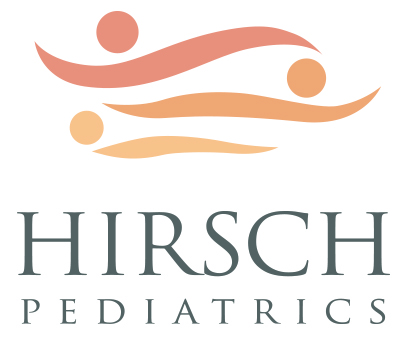Please Note: These guidelines are only for children who are fully vaccinated with no chronic medical illnesses.
These guidelines provide general guidance and should not be used as a substitute for the individual advice provided over the phone or at an appointment. If you have any significant or ongoing concerns, please call the office. Please contact Hirsch Pediatrics or go to the ER if your child is under 2 months old and has a fever (rectal temperature of 100.4 Fahrenheit or 38 Celsius).
These guidelines are written for patients of Hirsch Pediatrics and may not be copied or used without the written permission of Dr. Hirsch.
My infant/toddler has a fever. What should I do?
- DO NOT PANIC!
- Even for infants, fever is not harmful. Fever is a normal reaction of a healthy immune system that is responding to an infection. The vast majority of infections in children are due to viral illnesses and do not need antibiotics to treat.
- Fevers typically range from 100.4 – 105 degrees and may last for 3 – 5 days.
- To help your child feel better, please treat the fever!
If you say the fever is not harmful, why do you recommend TREATING THE FEVER?
- Most children are very uncomfortable with a fever and because of this they may appear very sick with decreased energy, decreased appetite, fussiness, and faster breathing.
- By treating the fever, you can avoid unnecessary sick visits as well as emergency room and urgent care visits.
- Typically within 1 hour of giving a fever reducing medication, your child should “RECOVER” and look significantly better. Once your child is more comfortable you will have a better idea if the underlying illness requires an office visit or more immediate attention.
What should I expect after I treat the fever, and when do I need to worry?
- After you treat the fever, within 1 hour your child should recover (see above). If your child recovers well then it is usually okay to continue close observation at home for the next few days.
- If after you treat the fever, your child does not recover well and continues to be extremely irritable, lethargic, or have difficult/rapid breathing, then please call to schedule an appointment ASAP. If it is after regular office hours, then I would typically recommend that you proceed directly to the emergency room or urgent care. Please see our website for information on our recommended urgent care and emergency rooms. If you need to go to an emergency room or urgent, we will contact you the next business morning to ensure your child is doing well and the appropriate management is in place.
- In addition, please schedule an appointment if your child has a low grade fever that after a few days suddenly becomes much higher.
How do I treat the fever?
- All children age 6 months and old should be given IBUPROFEN (Motrin, Advil, other generic brands) every 6 – 8 hours as needed for fever and fussiness.
- Important Note for children over age 6 months: Ibuprofen works significantly better and lasts longer for children and should ALWAYS be given instead of acetaminophen.
- All children age 2 – 6 months should be given acetaminophen (Tylenol, other brands) every 4 – 6 hours as needed for fever or fussiness.
- Please see our separate handout for a dosage chart. Note: For older children, you can also use chewables or pills according to the milligram dosage.
What else do I need to know about treating fevers?
- These are guidelines based on my experiences of treating many children. If you still have concerns or feel that your situation is different, please contact the office (regular hours) or urgent care/ER (after-hours). If you proceed to urgent care/ER, we will contact you the next business morning to ensure your child is doing well and the appropriate management is in place.
- If your child develops fussiness or fever and it is too soon for your next ibuprofen dose, you can give a dose of acetaminophen in addition to ibuprofen at any time. Just remember to space ibuprofen doses by 6-8 hours and acetaminophen doses by 4-6 hours.
- It is safe to give ibuprofen and acetaminophen (in the correct dosage and timing intervals) for as many days as is necessary. Please note that it is normal for fevers from viral illnesses to spike every 4 – 6 hours for 3 – 5 days in a row. However, please contact us if you have to give these medications for more than 5 days in a row.
- It is safe to give ibuprofen and acetaminophen with other medications including antibiotics, steroids, and Benadryl.
- If your child has a fever and symptoms that may suggest an ear infection, strep throat, or urinary tract infection, please call to make an appointment. If it is after-hours or weekends, it is okay to wait until Monday as long as your child is well-appearing and recovers well with acetaminophen/ibuprofen.
- Vaccines can typically cause fevers for 2 – 3 days.
- You can also give acetaminophen and ibuprofen for children who are fussy or uncomfortable for any reason even if there is no fever.
| Ibuprofen (Motrin , Advil, other generic brands)
may be given every 6 – 8 hours
Important note for children over age 6 months: Ibuprofen works significantly better and lasts longer for children and should always be given instead of acetaminophen. |
|||
| Weight | Ibuprofen
Milligram Dosage |
Ibuprofen
Infant Drops 50mg/1.25ml |
Ibuprofen
Children’s Liquid 100mg/5ml (Note: 1 tsp = 5 ml) |
| 12 – 17 lbs | 50 mg | 1 dropper
(1.25 ml) |
½ tsp
(2.5 ml) |
| 18 – 23 lbs | 75 mg | 1 ½ dropper (1.875 ml) | ¾ tsp
(3.75 ml) |
| 24 – 35 lbs | 100 mg | N/A | 1 tsp
(5 ml) |
| 36 – 47 lbs | 150 mg | N/A | 1 ½ tsp
(7.5 ml) |
| 48 – 59 lbs | 200 mg | N/A | 2 tsp
(10 ml) |
| 60 – 71 lbs | 250 mg | N/A | 2 ½ tsp
(12.5 ml) |
| 72 – 95 lbs | 300 mg | N/A | 3 tsp
(15 ml) |
| Acetaminophen (Tylenol, other generic brands)
may be given every 4 – 6 hours |
||
| Weight | Acetaminophen
Milligram Dosage |
Acetaminophen
Infant and Children’s Liquid 160mg/5ml (Note: 1 tsp = 5 ml) |
| 9 – 11 lbs | 60 mg | 1/3 tsp
(1.875 ml) |
| 12 – 17 lbs | 80 mg | ½ tsp (2.5 ml) |
| 18 – 23 lbs | 120 mg | ¾ tsp (3.75 ml) |
| 24 – 35 lbs | 160 mg | 1 tsp (5 ml) |
| 36 – 47 lbs | 240 mg | 1 ½ tsp (7.5 ml) |
| 48 – 59 lbs | 320 mg | 2 tsp (10 ml) |
| 60 – 71 lbs | 400 mg | 2 ½ tsp
(12.5 ml) |
| 72 – 95 lbs | 500 mg | 3 tsp
(15 ml) |
Looking for something else? Click here to view all of Dr. Hirsch’s medical advice topics.

